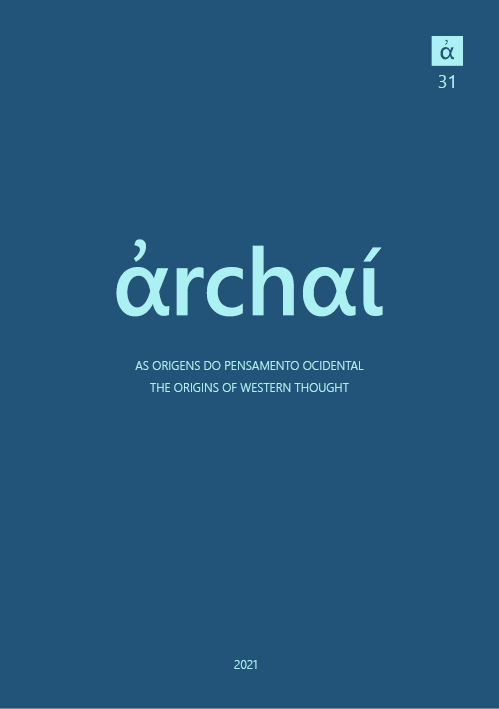Gorgias' Revising of Ancient Epistemology: on Non-Being by Gorgias and its Paraphrases
DOI:
https://doi.org/10.14195/1984-249X_31_27Keywords:
Gorgias, Parmenides, argumentation, argumentative structure, ancient epistemologyAbstract
The philosophical nature of the two versions of paraphrasing the Gorgias’ treatise On Non-Being — the skeptical version by Sextus Empiricus and the peripatetic version by an anonymous author — are discussed. The paper gives a comparative analysis of the arguments upheld by the informants enunciating Gorgias’ thoughts, demonstrates the range of philosophical problems, which Gorgias considered, judging by the reports of his speech, and shows how both versions add to and clarify each other in terms of philosophical issues. The work provides insights as to how Gorgias modernizes and transforms the initial attitudes of Parmenides, shifting the reasoning plan: from how thought can be directed to an object and the qualities of this object to how thought can be directed to the non-existent. Accordingly, the problems of intentionality in the Gorgias’ teaching are considered as well as the privileged status of any of mental states, the nature of word or speech as an autonomous way to develop knowledge about external objects, the issue of meaning as a reference, and inter-subjectivity in cognition. A conclusion is reached that giving preference to one of the paraphrasing versions impoverishes our understanding of the Gorgias’ teaching considerably, while the joint analysis of both versions demonstrates the engagement of the sophistic issues raised by Gorgias, in the philosophical and, particularly, the epistemological paradigm of the ancient as well as modern philosophy.Downloads
References
CASTON, V. (1998). Aristotle and the Problem of Intentionality. Philosophy and Phenomenological Research, n. 58, p. 249–298.
CASTON, V. (2002) Gorgias on Thought and Its Objects. In: CASTON, V.; GRAHAM, D. W. Presocratic Philosophy: Essays in honour of Alexander Mourelatos. Hampshire, Aldershot, p. 205–232.
CURD, P. (2004). The Legacy of Parmenides. Eleatic Monism and Later Presocratic Thought. Las Vegas, Parmenides Publishing.
KERFERD, G. B. (1955). Gorgias on Nature or That Which Is Not. Phronesis 1, n. 1, p. 3–25.
MOURELATOS, A. P. D. (1987). Gorgias on the Function of Language. Philosophical Topics XV, n. 2, p. 135–170.
MOURELATOS, A. P. D. (2008). The route of Parmenides: revised and expanded edition; with a new introduction, three supplemental essays, and an essay by Gregory Vlastos. Las Vegas, Parmenides Publishing.
OWEN, GEL (1960). Eleatic Question. Classical Quarterly, n. 10, p. 84–102.
PERLER, D. (2002). Theorien der Intentionalität im Mittelalter. Frankfurt am Main.
SCOLNICOV, S. (2003). Plato's Parmenides. Translated with introduction and commentary. Berkeley/Los Angeles/London, University of California Press.
STRIKER, G. (1996). Methods of sophistry. in: Striker, G. Essays on Hellenistic Epistemology and Ethics. Cambridge, Cambridge University Press, p. 3–21.
Downloads
Published
How to Cite
Issue
Section
License
Copyright (c) 2021 Marina Volf

This work is licensed under a Creative Commons Attribution 4.0 International License.
Given the public access policy of the journal, the use of the published texts is free, with the obligation of recognizing the original authorship and the first publication in this journal. The authors of the published contributions are entirely and exclusively responsible for their contents.
1. The authors authorize the publication of the article in this journal.
2. The authors guarantee that the contribution is original, and take full responsibility for its content in case of impugnation by third parties.
3. The authors guarantee that the contribution is not under evaluation in another journal.
4. The authors keep the copyright and convey to the journal the right of first publication, the work being licensed under a Creative Commons Attribution License-BY.
5. The authors are allowed and stimulated to publicize and distribute their work on-line after the publication in the journal.
6. The authors of the approved works authorize the journal to distribute their content, after publication, for reproduction in content indexes, virtual libraries and similars.
7. The editors reserve the right to make adjustments to the text and to adequate the article to the editorial rules of the journal.



